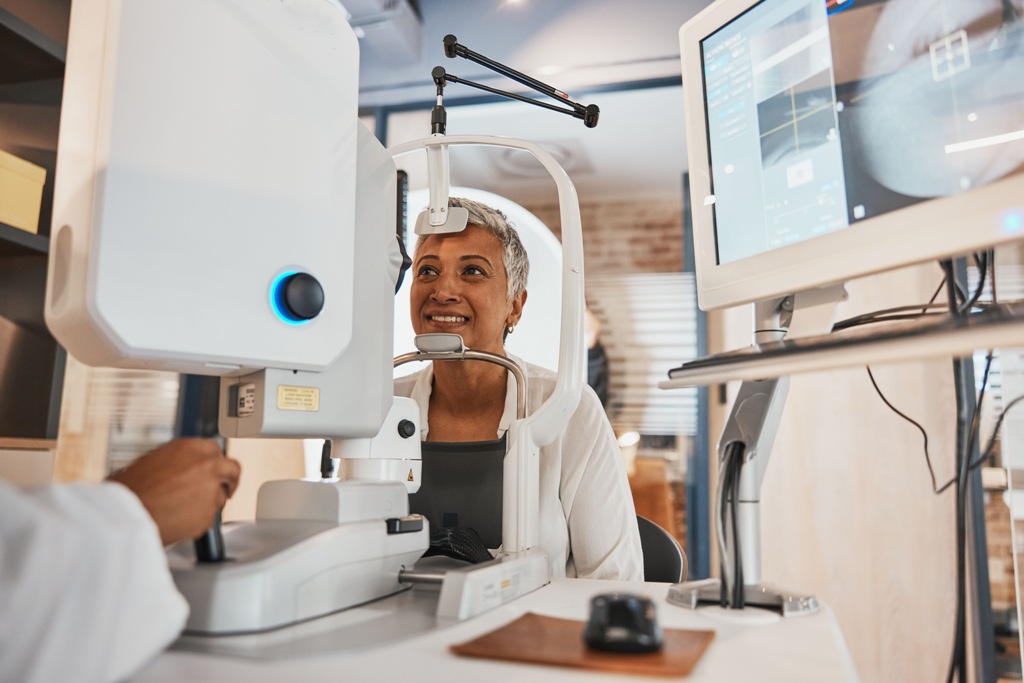According to the World Health Organization, at least 2.2 billion people worldwide have a near or distance vision impairment. In around half of these cases, vision impairment could have been prevented or has yet to be treated. Among these people, one of the main conditions causing distance vision impairment or blindness is cataracts (approximately 94 million people).
This is why early detection of cataracts is so important in preserving vision and quality of life today. With timely treatment, including laser cataract eye surgery, the potential for vision restoration is promising.
What Are Cataracts?
Cataracts are a condition marked by the clouding of the eye’s natural lens behind the iris and the pupil. This clouding typically occurs as we age, causing progressive, painless vision loss. Like a camera lens, the eye’s lens focuses light onto the retina and adjusts focus, letting us see things both up close and far away.
However, over time, the protein constituting the lens may clump together and start to cloud a small area of the lens. This is a cataract—and over time, it may grow larger and obscure more of the lens, making it harder to see.
Cataract Causes
- Age (adults over 40 at higher risk)
- Long-term exposure to ultraviolet light
- Side effects from diseases like diabetes
- Lifestyle factors like prolonged tobacco or alcohol use
How Regular Eye Exams Detect Cataracts
Comprehensive eye exams, especially for individuals over 40, are not just about updating prescriptions but more about checking the eyes’ overall health. During an eye examination, your optometrist or ophthalmologist checks for signs of eye diseases such as cataracts.
Lamp Exam
This non-invasive procedure involves using a high-intensity light source (slit lamp) to illuminate the cornea, iris, lens, and the space between the iris and cornea. The eye care doctor will look for any abnormality or change in the shape or color of these eye components, which could indicate a cataract or other eye diseases.
Early Symptoms and Signs of Cataracts
Blurry Vision: This is one of the earliest signs of cataracts, where objects near and far appear blurred or hazy.
Dimmed Color Perception: Colors may seem less bright than before as cataracts can make the lens yellowish or even brownish, causing a dulling of color perception.
Higher Sensitivity to Light and Glare: Individuals with cataracts commonly experience discomfort in bright light situations, such as sunlight or headlights from oncoming vehicles.
Poor Night Vision: Nighttime driving or navigating in low light can become more difficult.
Double Vision in One Eye: A cataract can cause a visual effect where one object is perceived as two.
Frequent Prescription Changes: People with cataracts may need more changes in their glasses or contact lens prescriptions than other people.
If you notice any of these symptoms, schedule an eye exam immediately.
Frequency of Eye Exams
The American Optometric Association recommends asymptomatic adults aged 18 to 60 perform a comprehensive eye exam every two years, while individuals over 60 should have annual exams. However, the frequency can vary based on individual risk factors like family history of eye disease, diabetes, high blood pressure, or visually demanding occupations. Consult with your eye care professional to determine an appropriate examination schedule.
Benefits of Early Detection of Cataracts
Prevention of Vision Loss: Detecting and treating cataracts in their early stages can significantly prevent vision loss. Timely cataract treatment, including procedures like cataract surgery, can restore vision and improve quality of life.
Preparation for Potential Surgery: Early detection of cataracts allows for sufficient time to prepare for the possibility of surgical intervention, allowing patients to make informed decisions regarding their treatment options.
Fewer Complications: Early detection and treatment of cataracts can also minimize potential complications associated with advanced stages of the disease.
Improved Lifestyle: With vision restored after cataract surgery, individuals can return to their daily activities and hobbies, improving their overall lifestyle and well-being.
Center For Sight: Your Go-To Resource for Cataract Surgery
At Center For Sight, we’re dedicated to delivering world-class cataract treatment improving vision using advanced technologies such as the RxSight Light Adjustable Lens, the TECNIS Synergy™ intraocular lens, and the groundbreaking LENSAR Laser Cataract System. Among the first in the country to perform Laser Cataract Surgery with the LENSAR femtosecond laser in 2012, our expert team has successfully performed thousands of laser cataract procedures.
As we prioritize innovation in treatment and personalized patient care, we invite you to contact the Center for Sight and see how we can enhance your vision and quality of life.
The advice in this blog is for general informational purposes only and may not be suited for your exact insurance plan and cataract needs. Therefore, consulting a qualified healthcare professional for personalized advice and treatment is essential.
About Center For Sight
Center For Sight provides ophthalmology, optometry, dermatology and cosmetic surgery services to patients in Southwest Florida. The practice offers patients convenient access to nationally renowned surgeons, highly-trained, compassionate staff members and cutting-edge technology. Center For Sight’s mission is to “bring clear vision to life” through trusting relationships and the unending pursuit of excellence in eye care. For additional information and locations, visit CenterForSight.net.
About Center For Sight Foundation
The Center For Sight Foundation is a donor-advised fund maintained and operated by the Gulf Coast Community Foundation, a section 501(c)(3) organization. The fund is composed of contributions made by individual donors. David W. Shoemaker, M.D., established the Center For Sight Foundation to support the annual Mission Cataract program, which restores vision at no cost for people living at the poverty level suffering vision loss due to cataracts. For more information, visit CFSFoundation.org.







